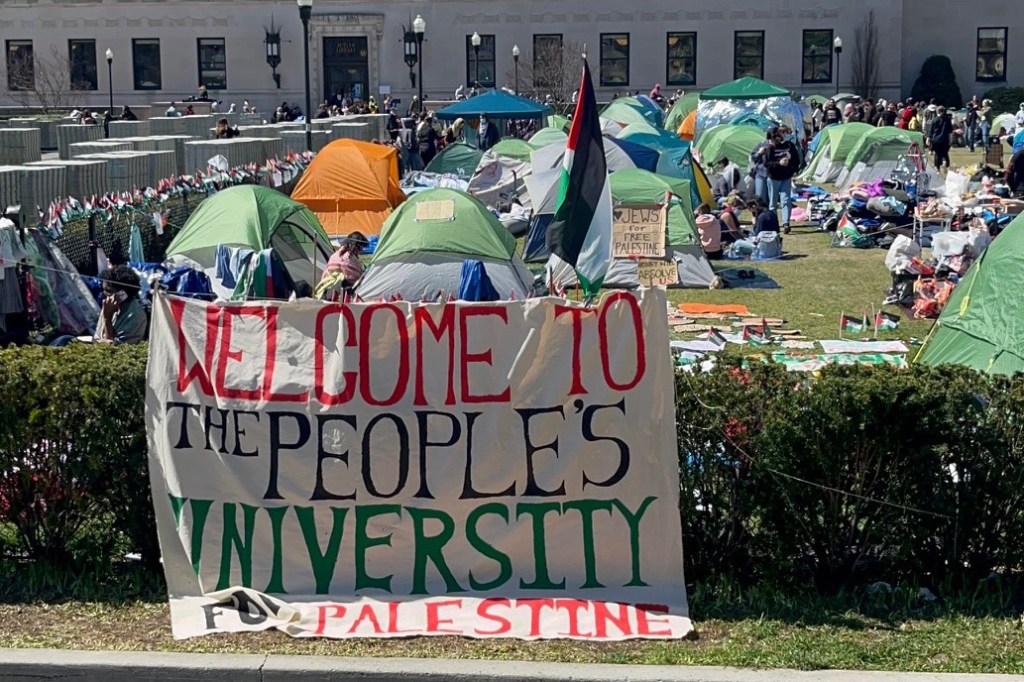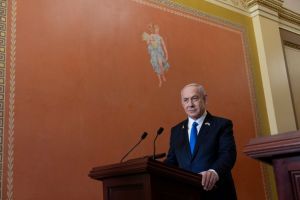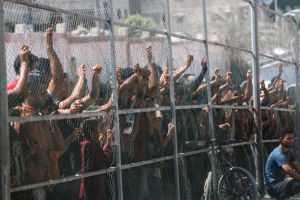New York
I’m on Columbia’s campus today. Sorry, I mean, “The People’s University for Palestine.”
I graduated from the university in May 2020. My alumni ID allows me access. A couple of days ago, student protesters started occupying the South Lawn, in front of Butler Library. The police force was called in. Some arrests were made. The police were able to clear the eastern half of the lawn, but the western half remains occupied. Students have pitched tents. Hand-painted signs hang from clotheslines that stretch around the lawn.
“Welcome to the People’s University for Palestine.” “Free All Palestinian Prisoners. Ceasefire Now.” “While You Read Gaza Bleeds.” “Admitted Students Enroll in Revolution.”
Palestine flags and keffiyehs are everywhere. And trans flags, of course.
“Japan for Palestine.” “Hindus for Intifada.” “Israel Is a Terrorist State.”
I walk the perimeter of the encampment, filming it on my iPhone. So many of the “occupiers” are women, I notice. In the northwest corner, ten or so are spread out on the grass, painting signs and posters. One paints a large tree. It’s a beautiful spring day — bright and sunny and in the mid-sixties.
How desperate these students are to reenact the 1968 protests, I think to myself. To be a part of something. To feel righteous. I was once one of them.
Many of the students are masked. “Admitted students enroll in revolution,” the sign said. And yet they don’t want to show their faces. I’m sure some are afraid of being doxxed — of having their identifying information published online. But why? So that they aren’t “canceled?” So that they can still secure a job at Goldman Sachs after they graduate from the People’s University for Palestine?
I didn’t think revolutionaries were afraid to show their faces.
Continuing around the perimeter, a young, masked woman just inside the encampment asks me to stop filming. I politely decline her request.
Now I’m in the Blue Java Café in Butler Library.
Earlier, I had stopped to chat with four students who lingered outside the encampment. I was no longer filming. I wanted to see how they felt about what was going on. They were clearly with the “resistance”: they were white, blond and accessorized with the appropriate regalia — bracelets and beanies and scarves.
They insisted everything be off the record. One student in particular seemed pretty paranoid. Her parents were probably investing a lot of money in her education. If she jeopardized her future job prospects, there would be hell to pay. I assured them that I wouldn’t identify them.
Last night, in bed, I watched a video that Sahar Tartak, the editor in chief of the Yale Free Press, had posted on X: it was nighttime in front of Butler. The occupiers had spotted “Zionists” in the camp. They linked arms and were slowly advanced in order to push the Jewish counter-protesters off of the lawn. A black student led the call-and-response. He was masked, but, judging by his voice, I would be surprised if he didn’t identify as transgender. The throngs of students — mostly women, it appears — repeated his words.
“WE ARE GOING TO SLOWLY…” WE ARE GOING TO SLOWLY…
“WALK AND TAKE A STEP FORWARD!” WALK AND TAKE A STEP FORWARD!
“SO THAT WE CAN…” SO THAT WE CAN…
“START TO PUSH THEM…” START TO PUSH THEM…
“OUT OF THE CAMP!” OUT OF THE CAMP!
“ONE STEP FORWARD!” ONE STEP FORWARD!
“ANOTHER STEP FORWARD!” ANOTHER STEP FORWARD!
“WE ASK…” WE ASK…
“THAT YOU PLEASE RESPECT…” THAT YOU PLEASE RESPECT…
“OUR PRIVACY…” OUR PRIVACY…
“AND OUR COMMUNITY GUIDELINES…” AND OUR COMMUNITY GUIDELINES…
“WHICH YOU HAVE SO FAR DISRESPECTED…” WHICH YOU HAVE SO FAR DISRESPECTED…
“AND LEAVE OUR CAMP!” AND LEAVE OUR CAMP!
“ONE STEP FORWARD…” ONE STEP FORWARD…
The leader is now centered in the frame of the video. He looks at the camera.
“Have you got enough video? ’Cause I look very pretty,” he says.
The women around him laugh. Some snap their fingers.
“You guys don’t have to do this, you know?” says a counter-protester, perhaps the one who is filming. “You’re all here because we’re here. Why are you…”
“We were here before you came here,” snaps the leader. He cackles, then continues his call-and-response as the counter-protester tries to speak.
“REPEAT AFTER ME!” REPEAT AFTER ME!
“I’M BORED!” I’M BORED!
“WE WOULD LIKE YOU TO LEAVE!” WE WOULD LIKE YOU TO LEAVE!
“REPEAT AFTER ME!” REPEAT AFTER ME!
“I’M BORED!” I’M BORED!
A young man in a keffiyeh steps in front of the camera to block the leader from being recorded. A young woman standing next to him politely tells the counter-protester, “We’re just actually trying to have a community meeting in a sec.” The young man adds, “We’re asking you nicely if you will please leave.”
“Why can’t we be on the lawn?” says a female counter-protester.
“Because you’re not respecting the safety…”
“You know I pay to go here?” she says. “And I pay for this lawn to be manicured, I pay for the lights to be on, and if you’re a student, you’re also paying for that.”
The video ends.
I returned outside to take some more photos. From atop the Sundial, a man speaks into a loudspeaker. A large crowd has gathered. He talks about the referendums for the university to divest from Israel. Columbia students voted to divest, he said. The crowd cheered. But, he added, Students for Justice in Palestine was silenced, and the university ignored the referendum. “Shame!” screamed the crowd.
“And now students at the encampment are suspended!” he added.
“SHAME!”
In 1968, the university placed on probation six anti-war student protesters inside Low Library. This outraged the student body and helped activate the larger revolt that soon followed.
“Divestment has been debated,” the man with the loudspeaker continued. “The discourse has happened at the university. And the student body at Barnard and Columbia College have decided to divest!” The crowd cheered. “Divestment is not a question anymore. It’s overdue,” he said.
“There are some things we should just not debate,” he said. “Just like we refused to debate the validity of white supremacy, we refuse to debate the humanity of Palestinians.”
“Gaza Solidarity Encampment: Community Guidelines,” written on a tall posterboard at the entrance to the encampment. I am told I must ask the students for permission to take a picture. I ask the young women holding up the poster for permission. They grant it.
- We all commit to remain grounded in why we enter this space — as an act of solidarity with the Palestinian People
- No desecration of the land, no littering
- We recognize our role as visitors, and for many of us, colonizers, on this land. We camp on colonized Lennapehoking [sic] land and recognize Columbia’s complicity in the displacement of the Black and Brown Harlem Community
- No drug/alcohol consumption inside the camp. We want to ensure people feel comfortable in this space — Please keep substance use outside the camp!
- Respect personal boundaries — tight quarters are not an excuse to cross physical boundaries without affirmative consent
- We commit to never photograph or videotape another community member without their affirmative consent.
- We commit to never share the names of details of anyone we meet in this camp. We keep us safe, which includes refusing to comply with any demands if the NYPD or Columbia admin try to force us to disclose the identities of any fellow campers
- We commit to assuming best intentions, granting ourselves and others grace when mistakes are made, and approaching conflict with the goal of addressing and repairing
- Please think of community members when making decisions about autonomous actions. Not everyone has consented to the same level of risk, but everyone will be impacted by decisions community members make
- Do not engage with the counter-protestors
“Please contact a CUAD [Columbia University Apartheid Divest, a coalition of student groups, including SJP] organizer to suggest guidelines or changes to the list above. Free Palestine!”
I stopped to talk to a woman who stood alone on campus walk. She was white and appeared to be in her late forties. She had an accent I couldn’t place. She told me that she was a human rights graduate professor. She didn’t give me her name. I told her I was an alum and that this my first visit to campus since the encampment began. I told her that it was unsettling.
“Does it look peaceful to you?” she asked me.
We both looked out ever the encampment.
“Yes, for the most part,” I said.
“What part doesn’t look peaceful?”
I looked again. “No, it all looks pretty peaceful right now,” I said.
“See how peacefully students can protest when the police aren’t involved?”
Later, I learn that Israeli professor Shai Davidai, who hoped to lead a peaceful counterprotest, was denied entry to the campus by Columbia’s COO, Cas Holloway. Davidai reported on X that his Columbia ID has been deactivated.
Yesterday, Jewish students received an email from a Columbia rabbi. He recommended they stay home from campus because he feared it was now unsafe for Jews.
“Yes,” I might have told the human rights professor. “Pro-Hamas students can protest peacefully — when Jews stay off of campus.”
At the entrance to the encampment, I see Jack (Judith) Halberstam. Halberstam is a professor in the Department of English and Comparative Literature and the Institute for Research on Women, Gender and Sexuality. In her 2011 book, The Queer Art of Failure, now considered to be a part of the queer theoretical canon, Halberstam promotes failure for queer people — that is, unemployment, slacking off, ignorance, stupidity and even self-cutting. Halberstam wrote, “Failure allows us to escape the punishing norms that discipline behavior and manage human development with the goal of delivering us from unruly childhoods to orderly and predictable adulthoods.” The “disappointment, disillusionment, and despair” that are sure to result from failure might suck, wrote Halberstam, but at least we can “use these negative affects to poke holes in the toxic positivity of contemporary life.”
Halberstam wrote that success should be left “to the Republicans, to the corporate managers of the world, to the winners of reality TV shows, to married couples, to SUV drivers.” Easy for Halberstam, a published author and a well-paid (I imagine) professor at an Ivy League university, to say. Something tells me the kids who take Halberstam’s advice — the “queer” kids who thrive on nihilism, the kids who rebel and who self-mutilate — might not find failure to be as enjoyable as Halberstam has found it to be.
I am not at all surprised to see Halberstam here. It is all the same fight. Anti-West, anti-America, anti-Israel, anti-capitalist, anti-normativity, anti- anti- anti-. Neo-Marxism. The oppressors versus the oppressed.
Later, I return to Butler to charge my iPhone. As I’m exiting the library, a young woman with a long dark ponytail enters the vestibule. She quickly drops her bag, takes out the flag of Israel and wraps it around her. We make eye contact. She smiles defiantly and then walks outside, onto the quad.





















